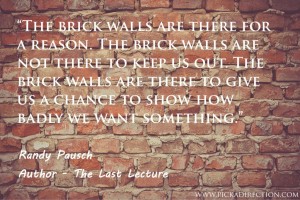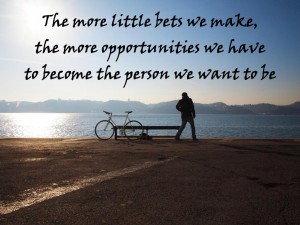Today we honor one of the greatest leaders this world has ever known. He was the epitome of a man who stood by his message and did not waiver. I have great deal of respect for that quality, not many people are like that anymore. Dr. Martin Luther King, Jr. has been brought up in multiple books that I have read recently and I love it when I get to learn something new about the civil rights movement or Dr. King himself. Today we examine how to be opportunistic through Dr. King’s work in Birmingham in the 60’s.
David & Goliath
My current read, David and Goliath: Underdogs, Misfits, and the Art of Battling Giants by Malcolm Gladwell, argues against what we typically think of “strengths” and “advantages.” He outlines how some of the world’s most successful people can barely read because of dyslexia and how the things we think of “disadvantages” can be the key to our true strengths and ultimately our successes.
In Chapter 6, Gladwell talks about how Dr. King and a pastor named Wyatt Walker led the civil rights movement from Birmingham. They poked and prodded the local government through marches and sit-ins, hoping to get some sort of reaction out of them that was national newsworthy. They recruited teenagers and children to protest because they knew how powerful police brutality directed children could potentially be if it made the news. Plus, if they were arrested, it would not hurt families as bad economically, as opposed to a parent being thrown in jail. Their plan finally worked when this image was captured and publicized across the country.
 As the media caught wind of the photo, the scene unfolded just as Dr. King planned. The reports came out about peaceful protests and police brutality on children and national support for the civil rights movement soared. The police chief, who ordered the use of dogs and fire hoses, was relieved and the black community united as Birmingham began the journey desegregation.
As the media caught wind of the photo, the scene unfolded just as Dr. King planned. The reports came out about peaceful protests and police brutality on children and national support for the civil rights movement soared. The police chief, who ordered the use of dogs and fire hoses, was relieved and the black community united as Birmingham began the journey desegregation.
Hard Work or Dumb Luck?
Dr. King and Wyatt Walker worked very hard to accomplish what they did in Birmingham. They protested, they marched, they boycotted, and they did it all without violence. They had so much patience – and faith – for their plan that they did this for years, looking for that single opportunity to bring their cause to the rest of the world. They did not know that the national media would take the photo and run with it, but they sure hoped it would.
Dr. King practiced something (many things actually) that all of us can learn from. He understood that the harder he worked, the luckier he would be. All he needed was a little ‘luck’ for one of his demonstrations to be picked up by the national media. The world wasn’t streaming live on social media as it does today. So he kept preaching, and protesting, and loving his enemy. He never gave up, and when someone as influential as John F. Kennedy got involved, Dr. King knew that big changes were sure to come.
But remember, it took him years to get to that point. He had to put in the seemingly endless work to get that ‘lucky’ just to have that photo spread like it did. He was poised and ready when the national media grabbed the photo and it’s accompanying story. When he saw the opportunity, he capitalized on it.
A Hole In One
Ever since I’ve heard that connection with hard work and luck, I’ve related it to golf. Yes, it takes some luck to hit a hole in one. The wind has to be good, the ball must roll just at the right angle, the slope of the green has to be perfect, and more.
But if you practice every day, you’re going to get closer and closer and you’re going to have more opportunities as well. So when it eventually happens, it was the product of that hard work, not luck.
A Furniture Anecdote
In my previous life I was a trainer of furniture slingin’ sales people. Part of my job was train them how to sell it: steering people into products that we had in stock, maximizing profit, asking for referrals, and much more. Each sales person was purely commission based, so their paychecks reflected how well they sold furniture and they could determine what price to charge, so they had total control of their pay.
I had a young man that was excellent with customers, but didn’t always maximize his profit. He was not on his A-game one day, but lucked out with some very nice customers that fell in love with one particular bedroom set. In sales, when someone ‘loves something’ they are usually willing to pay more for it. This young man realized that they loved this bedroom set and he swung for the fences; he threw out a high price and they loved it.
Great job! But then, they asked about a second nightstand for the bedroom set. As a commission based sales person, this is a great opportunity to make some more money. Instead of swinging for the fences again, he gave them the second nightstand for free because he had “good profit” in the sale. Had he worked harder and been prepared for that situation, he could have made an extra $50 for giving them something they already wanted.
ASIDE – Those of you that have never been in sales are probably shaking your heads and saying, “See, that’s why I hate sales people!” But you have to understand, this is how they are paid, and that’s how we they put food on the table at night. Plus, for every story like that, I have a story about customers trying to cheat us out of product or trying to get us to deliver something for free. It offsets, and those opportunities to up-sell do not come ever day.
Dr. King and Wyatt Walker were patient opportunists. They were able to capitalize when they saw their opening. They worked on what they believed in, and they stuck to it. Their plan worked and it worked because they put in hard work. They didn’t know when and where their ‘luck’ would strike, but they knew if they stayed focused it just might happen. Turns out they got ‘lucky’ after all.
—
Have you ever been ‘lucky’ like this? What happened? Were you able to capitalize on the situation as Dr. King did? Leave me a comment or chat with me on Twitter.
Happy Birthday Dr. King!








